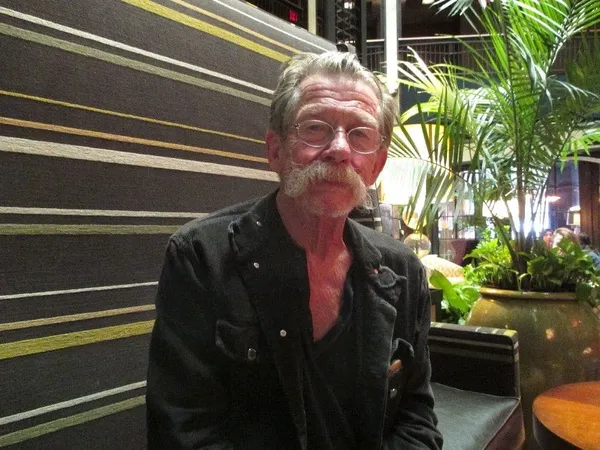 |
| John Hurt on Bong Joon-ho's Snowpiercer in New York: "He is quite different but technically, he is as clever as Hitchcock." Photo: Anne-Katrin Titze |
At the Tribeca Grand Hotel in New York, John Hurt and I met up to discuss his pivotal role in Bong Joon-ho's not so merry-go-round science fiction thriller Snowpiercer. Hurt stars with Chris Evans, Kang-ho Song, Tilda Swinton, Ed Harris, Jamie Bell, Octavia Spencer and Ah-sung Ko as the last inhabitants on an iced-over Earth. We also spoke about his work with John Huston, Fred Zinnemann and Richard Fleischer, Jim Jarmusch's Only Lovers Left Alive, the triad with Lars von Trier - Dogville - Manderlay - Melancholia, and David Lynch's The Elephant Man. The genius of Brecht combined with Michael Colgan's Gate Theatre may turn into a new adventure for the consummate actor.
When I arrived, John Hurt was having lunch while watching the World Cup at the bar. He was surprised how much soccer viewing was available to him in the US.
 |
| John Hurt at the Tribeca Grand Hotel on the World Cup: "Well, Americans got better and better over the last twenty years and now they're doing very well." |
Anne-Katrin Titze: Americans seem to be slowly getting into it.
John Hurt: Well, Americans got better and better over the last 20 years and now they're doing very well. They might even beat Germany, which would be wonderful.
AKT: Why is that?
JH: Because I'm English! [England was eliminated in the first round]
AKT: So you want America to win?
JH: Of course I do. I think that would be brilliant. Wonderful, terrific players. You're probably Italian?
AKT: No, actually, I'm not.
Hurt screeches half apologetically, half in mock horror. Then he laughs.
JH: Honestly, I don't give a damn.
AKT: I thought so. And I couldn't really care less about who wins the World Cup. July 1, 2014 is fast approaching, which is the day of the catastrophe in Snowpiercer. The day the world freezes to ice with only one train in perpetual motion remaining. Were you aware of the date?
JH: No. July 1, is it? I knew it was 17 years [later that the film takes place. In 2031] which I think is important and also the fact that it was a human disaster, not like a natural disaster.
AKT: Are you attracted to these catastrophes? I am thinking also of Lars von Trier's Melancholia.
JH: Well, yes. I can understand your question. I am really the victim of other people's imagination.
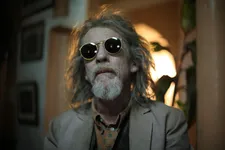 |
| John Hurt also worked with Tilda Swinton in Only Lovers Left Alive: "I've known Tilda since she started, really." |
AKT: Why do you say victim? Why not host?
JH: It depends which way you're looking at yourself.
AKT: In Melancholia, von Trier is interested in explaining how the world ends on a different level. Bong Joon-ho gives the reason that humanity miscalculated in countering global warming.
JH: Here you have a sort of chance. You sort of feel, all the way through that they have a chance. Hence it is imperative that they keep the status quo. If the status quo gets upset and there is a revolution that is successful, it could and would destroy everything. My character [Gilliam] seems to be on both sides.
AKT: You see him as a double agent?
JH: He is not a double agent, really. He started it with Wilford (Ed Harris), we know. He has taken a humanitarian aspect and Wilford said, "I'm going to deal with the mechanical aspect how things work."
AKT: Your character's sacrifice and self-mutilation sets the revolution in motion.
JH: When we get later into the film we realise that's why he is limbless.
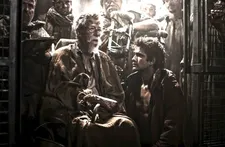 |
| John Hurt as Gilliam in Snowpiercer: "The most pessimistic was my part, because of his knowledge. He knows how it started." |
AKT: Is that an umbrella handle as an arm?
JH: It's all sorts of bits and pieces they could find to make it work.
AKT: There's a little bit of Elephant Man to him, to go back in your career. Elephant Man in 2031?
JH: Elephant Man was much more difficult physically. This had a couple of days. It was quite tricky. I had my leg strapped up behind me and I am a little older now. It was all marvelous, though. He [Bong Joon-ho] is one of the most fabulous directors in the world.
AKT: And you've worked with really great ones!
JH: Well, from John Huston to Fred Zinnemann and Richard Fleischer and all those great American directors.
AKT: How was working with Fred Zinnemann?
JH: With Zinnemann I did A Man For All Seasons. He was my screen godfather. I'm happy to say he was.
AKT: How would you describe Bong Joon-ho's style of directing?
JH: He is quite different but technically, he is as clever as Hitchcock. That's saying something. In humanitarian terms, I think he is much cleverer. He is one of the best directors I've worked with. I absolutely adore working with him.
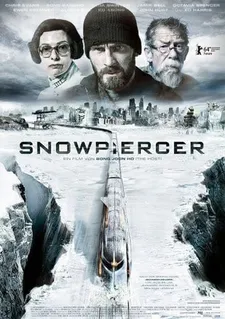 |
| Snowpiercer poster |
AKT: Were you familiar with his films before?
JH: Not until we met. They're wonderful. The Host, Mother, Memories Of Murder.
AKT: Tell me a little more what you discovered in connection to the humanitarian aspect and why it made you think of Hitchcock in comparison.
JH: Hitchcock was very interested in the image on the screen. As is he. As is any good cinema director. That is the language they speak. It is not literature, it is images on screen. He is more interested in the humanities than Hitchcock.
AKT: Were you talking about this?
JH: Oh, no. I wouldn't embarrass him.
AKT: I didn't mean the Hitchcock comparison. I meant the "humanitarian aspect."
JH: Oh, absolutely. You have to listen to directors.
AKT: Well, some don't talk.
JH: Ha, ha. Well he does. During shooting, his English was much better than it is now. He's been back in Korea for a bit.
AKT: You were working with Tilda Swinton in Snowpiercer and Only Lovers Left Alive. Which one came first?
JH: Indeed. Only Lovers came second.
AKT: So you got to clean up a little, both of you. You look a little nicer as vampires in the Jarmusch film.
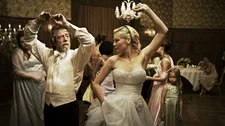 |
| John Hurt with Kirsten Dunst in Melancholia: "I love working with Lars! I've worked with him three times. I did the narration of Dogville and Manderlay |
JH: I really did smash my heel up and I really was on crutches in the second one. He [Jarmusch] put me on crutches because I couldn't walk. I've known Tilda since she started, really.
AKT: You never worked together before these two films?
JH: No. She's a very clever girl. She always was.
AKT: When you work with the same co-stars on two different projects, did you ever get confused where you were?
JH: Oh I'm confused about where I am nearly all the time. It has nothing to do with playing parts really. One wonders sometimes, looking at the world, how it's dealing with itself. There are days when you wake up and you feel very optimistic and there are days when you feel pessimistic.
AKT: Would you say Only Lovers Left Alive is an optimistic or a pessimistic film?
JH: Lovers? I'd say it's optimistic, definitely. Because anything which retains interest is optimistic. When the characters become disinterested, it's pessimistic. Does that make sense?
AKT: It does. And Snowpiercer?
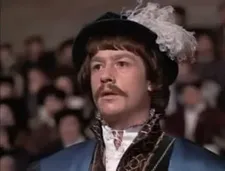 |
| John Hurt in A Man For All Seasons. On Fred Zinnemann: "He was my screen godfather." |
JH: Snowpiercer has both. It was essentially optimistic. The most pessimistic was my part, because of his knowledge. He knows how it started. The status quo, he knows, has to be maintained, otherwise there is no chance. He knows that this revolution is completely understandable and is also commendable. He also knows the negatives. In the end, that's not a very positive position to be in.
AKT: Are you sometimes glad that you are not in the position your characters are in? That you don't have to make those decisions? Do they ever haunt you?
JH: We are all in these positions. You're a writer. It's all the same thing. It's all the use of the imagination.
AKT: The predicament your character in Snowpiercer is in - I am not in that position [to save or condemn humanity]. Nor are you, John Hurt.
JH: But you have to write an article. And that article is either going to say something that is optimistic, realistic, or pessimistic. Most artists would say, I'm going for realism. But then…
AKT: But then what is realism?
JH: The great joke is that a realist is an optimistic pessimist. That's very witty. Whether it's truthful or not, that I don't know.
AKT: The entire film takes place on a train. On the one hand, it's a metaphor, on the other, a train is very relatable for everybody. Most everybody has been on a train. Do you have a train experience that relates to this film?
John Hurt at this moment makes train noises for me.
JH: I've got plenty of train memories. I was sent to school when I was eight years old in 1948 in Kent. So I had to go through London in 1948, just after the war. Many, many strange experiences. There were no corridors. To go to the loo you had to wait till it stopped at the station.
AKT: In Snowpiercer the train is very long. It is amazing how much of humanity it contains. Did you read the graphic novel [the French graphic novel Le Transperceneige by Jacques Lob, Benjamin Legrand and Jean-Marc Rochette]?
JH: No. Often I don't read novels. The script is more important, that's the springboard to your imagination, really. Peripheral information can be interesting to read but you can't use it when it's not in the script. I stopped asking a long time ago, "why would you want me to play that?" I'm an actor. That's what I do.
AKT: You worked with Lars von Trier on several films.
JH: I love working with Lars! I've worked with him three times. I did the narration of Dogville and Manderlay and then I did the father in Melancholia.
AKT: A brilliant film.
JH: I think he has a touch of genius.
AKT: You pick the geniuses. Or they pick you?
JH: Bong Joon-ho is enormously sensitive to performance. He knows what he needs to see and that's all he needs to shoot. He is so daring. We don't do that in the west. We shoot everything. I suppose it's a masculine film to a degree. It's not without femininity.
AKT: What does that mean to you? Where is the femininity?
JH: I mean feminine sensibility.
AKT: I didn't see much of that, whatever it is. I think you have to be quite tough.
JH: It is about revolution, which is a masculine subject.
AKT: Not revolution itself, that is not necessarily masculine. Snowpiercer has a Metropolis feel to it. Some of the constellations reminded me of Fritz Lang. At the same time, they had something Brechtian.
JH: I think that's a very good acute observation. There is a Brechtian quality about it because it's demonstrating something rather than it is being something.
AKT: Did you ever perform in a Bertolt Brecht play?
JH: I've never done a Brecht. In the1960s when the Berliner Ensemble came over [to England] with Helene Weigel [Brecht's second wife], I saw all the Berlin actors. It was an amazing time, very exciting early 1960s.
AKT: That's something to look forward to, perhaps? Would you like to do Brecht? Who would you like to work with on that?
JH: I would do it without any question with Michael Colgan at the Gate Theatre in Dublin. I trust his perception. All over the world I've done Krapp's Last Tape with him. I did it here at BAM. Last time was in LA, that's one I was worried about because it's not a theatre town. But it was fantastic.
AKT: I would like to see you do Brecht at the Gate Theatre.
JH: What I like about Brecht, it's very interesting. When Helene Weigel came over and somebody talked about Lotte Lenya and said, "Well, she wasn't alienating." And Weigel said "No, no, no. Why, Lotte Lenya was so true - who cares?" She said: "Berti only developed the theory of alienation in order to stop bad acting." I heard her say that. Now that's brilliant. This whole theory of alienation that intellectuals have been passing on, really is just to stop a lot of ham acting. If you fill something with a proper emotion, it didn't worry him at all.
AKT: Brechtian theory doesn't mean a lack of emotion.
JH: That's what she said. Lotte Lenya was all emotion. She wasn't anything but emotion. She was not an intellectual.
AKT: Brecht's characters say what nobody says. "I am an exploiting, evil capitalist." Who says that in real life? The truth is explicit. "I am the evil capitalist. Now deal with it."
JH: That's right. Can I change that line? No. That's what he says.
In the second of my conversations on Snowpiercer, I speak with director Bong Joon-ho on Metropolis, legends, Tilda, The Host, global warming, superstitions and sushi.
Snowpiercer opens this Friday, June 27 in the US. Its remaining screenings at the Edinburgh International Film Festival are on June 28 and June 29.





















